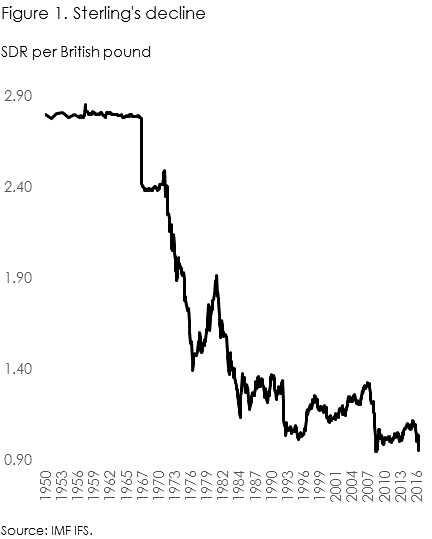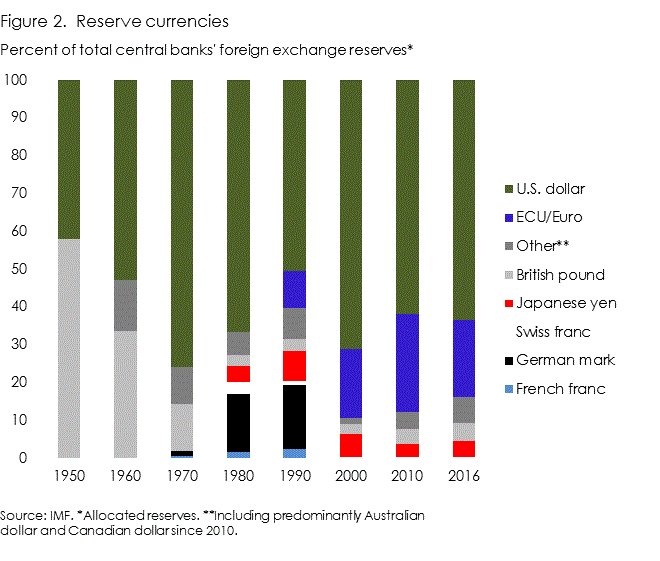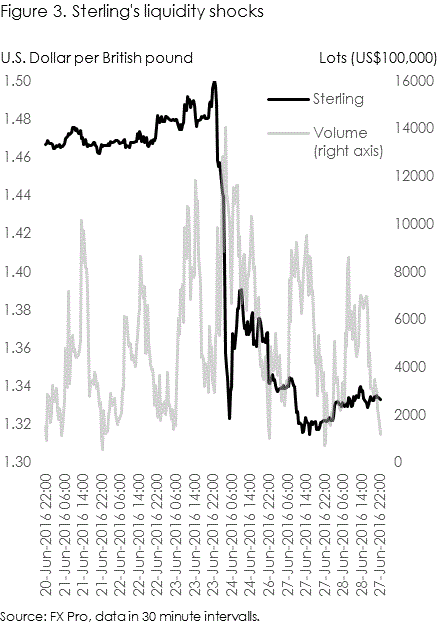International monetary dimension of Brexit
Conference—Reform of Global Financial Architecture: Short Term Measures and Long Term Goals
Southwestern University of Finance and Economics
Shanghai Development Research Foundation
Reinventing Bretton Woods Committee
Chengdu, 22 July 2016*
Ladies and Gentlemen,
It is a great pleasure to have been invited to offer some short remarks at this most topical and timely conference. I shall focus here on the international monetary dimension of Brexit.
Brexit is a calamity. I believe it will diminish the U.K. This will lead to reducing further the role of sterling as an international currency. It will have adverse consequences for national policies but also for the international monetary system. Brexit therefore makes reforming the global financial architecture more urgent.
I shall try to make three points: i) Brexit provides a major break from the long-held ambition of seeking national interest through multilateral cooperation; ii) a demoted sterling is set to magnify international currency concentration; and iii) the episode serves as a reminder that the international monetary system lacks mechanism allowing for orderly exchange rate adjustments.
On the first point, the U.K. chose to turn its back on the foundations and spirit of multilateralism. It seeks to revert to a time when nationalist interests seem incompatible with international ones when countries sought strength from the weakness of their neighbours and when individual advantage trumped collective gains.
To be reminded of what multilateralism is about, the Bretton Woods conference seems a good starting point. U.S. Treasury Secretary Henry Morgenthau and President of the Bretton Woods Conference remarked in his address to the Closing Plenary Session in July 1944:1
"There is a curious notion that the protection of national interests and the development of international cooperation are conflicting philosophies—that somehow or other men of different nations cannot work together without sacrificing the interests of their particular nations. Yet none of us has found any incompatibility between devotion to our own countries and joint action. Indeed, we have found on the contrary that the only genuine safeguard for our national interests lies in international cooperation."
Fragmentation was the central concern of Bretton Woods. Edward Bernstein, a key U.S. Treasury official at Bretton Woods wrote in December 1944:2
"The world is in desperate danger of reverting […] to economic isolation that will inevitably breed political isolation. Those who talk […] of bilateral agreements with one or two countries, are in fact proposing that we do nothing, that we allow the world to drift back to the restrictions and the disorders of the prewar decade. [There is a] fundamental principle that international economic problems are an international responsibility that can be met only through international cooperation."3
The Bretton Woods system ended with the Nixon-shock in 1971. It was a unilateral action to end a multilateral commitment with considerable adverse externalities. It disrupted the main channel of economic policy cooperation. Brexit is a Nixon-shock type event.
Needless to say that multilateralism has never been fully implemented and has been in decline for some time nor do I wish to project a romanticised version of multilateralism that never existed. However, Brexit risks validating a more confrontational approach that avoids compromise to achieve corner-solution outcomes. It constitutes a regime shift.
On the second point, Brexit accelerates the unwinding of sterling as an international currency. Sterling has been in decline at least since World War II both in terms of its exchange rate vis-à-vis other major currencies and as a reserve.4 Sterling was forced to devalue multiple times under the Bretton Woods system and depreciated against the SDR currency basket of major international currencies gradually and at times severely through the early 1990s with some occasional rebounds. Sterling reached a new low against the SDR after the Brexit vote last month (Figure 1). As a reserve, sterling balances were blocked during World War II and unwound through a series of G10 initiatives to allow for an orderly reduction including through the sterling "safety net" in the 1970s.5 Representing nearly 60 percent of total central bank non-gold reserves in 1950, sterling's share in central banks' non-gold reserves fell to 34 percent in 1960 and 13 percent in 1970 and stood at 3-5 percent since (Figure 2). The persistent high concentration of central bank reserves, also as a proxy for safe assets more generally, held in the major currencies and the dominant use of the dollar in international transactions means the loss of an international currency like sterling will exacerbate international currency concentration.
On the third point, Brexit illustrates that exchange markets remain fickle. During the night of the E.U. referendum with the announcement of the early election results of the Sunderland voting district in the North East of England, only the 4th out of 382 voting districts to declare, showing a strong lead for the Leave campaign, sterling started to drop sharply against the dollar. Between 23:30 hours on 23 June through 5:30 hours on 24 June, sterling depreciated against the dollar from US$1.4973 to US$1.3231, a 12 percent fall (Figure 3). Leaving aside why the dollar should benefit from an unexpected election outcome in the U.K., the fall signifies naturally that there were nearly not enough dollars in the market to accommodate the shedding of sterling. The asymmetric liquidity shock for a foreign-exchange major suggests that the exchange market does not offer sufficient safety provisions to allow for orderly and measured exchange rate movements in the event of sudden distress. This despite the anticipation of a possible adverse outcome in the case of the E.U. referendum and a standing dollar liquidity swap line between the Federal Reserve and the Bank of England. Lesser foreign exchange rates are most likely even more vulnerable. The asymmetry in international liquidity distribution remains acute.
In conclusion, Brexit poses a threat for the stability of the international monetary system. It should reinvigorate the debate about the advantages of multilateral cooperation and that national and international interests can be addressed most effectively together. Brexit should lead to reinforce calls for international currency diversification to ensure the system becomes less dependent on the dollar and vulnerable to highly idiosyncratic shocks. More pockets of international liquidity are needed to allow for orderly exchange rate adjustments.
The G20 Finance Ministers and Central Bank Governors in February declared that "a stable and resilient international financial architecture is a key element to foster strong, sustainable and balanced growth."6 The system is neither stable, nor resilient nor does it produce strong and balanced growth. The system needs innovation. Brexit calls for accelerating meaningful efforts to achieve it.
Thank you.



*Delivered in Session 1 Global Economic Integration under Stress: Negative interest rate policy and Brexit.
1Department of State, United Nations Monetary and Financial Conference, Final Act and Related Documents, Publication 2187, U.S. Government Printing Office, Washington, D.C., 1944, pages 7-10.
2The text was to promote ratification of the Bretton Woods agreement by the U.S. Congress. The U.S. Congress ratified the Bretton Woods agreement in December 1945.
3 Edward Bernstein, Monetary stabilization: The United Nations Program, address to the Graduate School of Public Administration, Harvard University, 11 December 1944, page 13.
4 On a survey of the modalities of the decline of the British pound as a reserve currency, see Schenk, C. (2009), "The retirement of sterling as a reserve currency after 1945: Lessons for the US Dollar?" mimeo, University of Glasgow, May 2009.
5 The Banker commented that "the [Basle] arrangements are symbolically important as the first concrete step to help phase out sterlin's long role as a reserve currency," The Banker, "Sterling policy now," February 1977, page 15.
British Prime Minister Callaghan coined the phrase "safety net" within the context of the financial support package for the British pound in 1977. The Times (12 January 1977) reported that Callaghan announced a "financing facility […] as a safety net for Britain's sterling balances." The Times (7 February 1977) posted as headline "Safety net if reserves drop below US$6750 million" to describe the then newly established support mechanism for the British pound.
The IMF 1977 Article VIII report described the measures as "keeping with one of the main purposes of the arrangement to permit an orderly diminution in official sterling balances to working levels […]. The U.K. representative said that they intended to continue to encourage official holders to reduce their balances to working levels […]," IMF (1977), United Kingdom—Staff Report for the 1977 Article VIII consultation, Washington D.C., 30 June 1977 (SM/77/155).
6 Communiqué G20 Finance Minister and Central Bank Governors Meeting, 26-27 February, Shanghai.